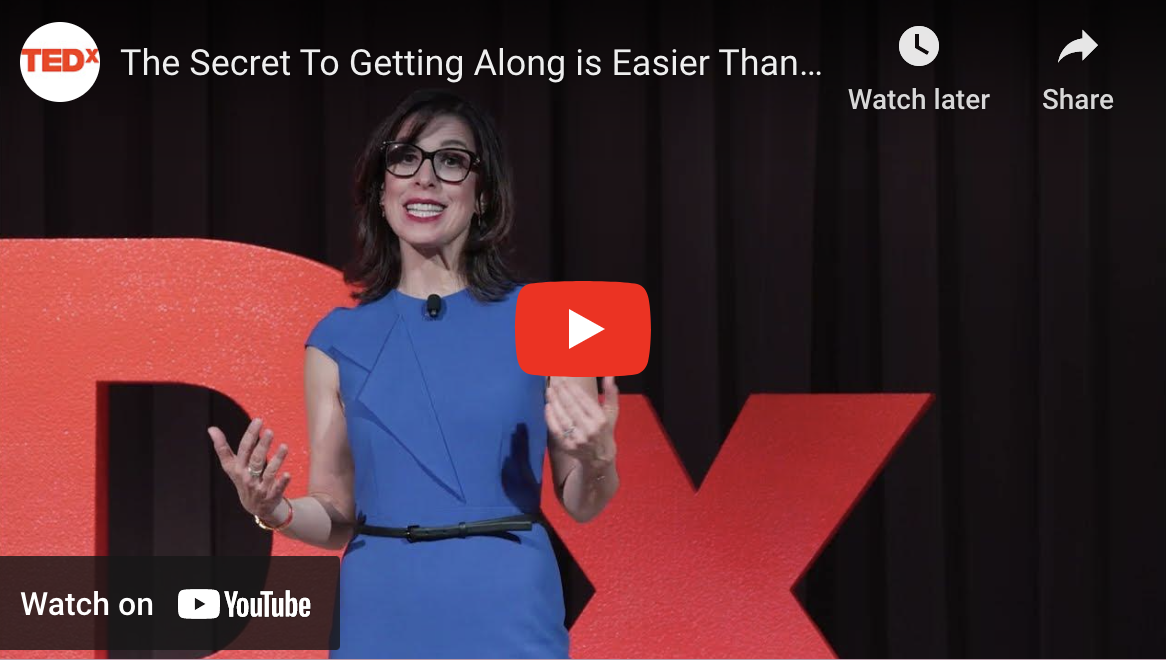5 Things You Need To Know About Co-parenting With A High-Conflict Ex

When going through a divorce, there is so much to unpack, not only financially and logistically but emotionally. No matter the reason for divorce, it has an effect on all areas of your life.
It is a time of high stress and oftentimes, uncertainty which brings about a lot of additional anxiety about the future, especially when you also share children with your ex. And when you are co-parenting with a high-conflict ex, navigating divorce can be more challenging.
Children can’t be divided up like the finances, property and other assets. If it’s a high-conflict divorce, children are often caught in the crossfire and used as weapons against the emotionally safe and healthy parent.
Divorcing someone who has a personality disorder, high-conflict, toxic, abusive, or just plain difficult comes with its own set of unique and often damaging consequences.
When you’re unprepared and don’t have a strategy in place, the outcome you get in mediation or court won’t be in your or your children’s favor.
Here’s what you need to know when you’re co-parenting with a high-conflict ex:
1. They will use the divorce to punish you.
If you are co-parenting with a high-conflict ex, they will punish you in any way they see fit. The children are usually a guaranteed way to do this as they know how important that relationship is to you.
As far as your ex is concerned, they will attempt to make you pay not just financially but emotionally and mentally.
Sharing children with someone of that nature is not easy. Unlike a “normal” divorce, it’s extremely hard if not impossible to get on the same page as the other party isn’t interested in seeking the children’s best interest.
Sadly their own goal is hurting and punishing you further as well as reducing the child support they provide by opting for 50/50 or in some cases full custody, as ridiculous and absurd as that sounds.

2. The abuse may continue, even after the divorce.
When dealing with someone high-conflict it means that you will continue to be on the receiving end of their abuse through the children and the family court system.
Your ex will have no problem telling lies under oath, painting you as the abusive party and them as the victim. They will also smear your name and call you an unfit parent to anyone who will listen, all to suit their narrative.
Basically, whatever they’re guilty of doing, they will project that behavior onto you so that you appear to be unstable and they come out smelling of roses.
This is more often the tactic used when dealing with someone narcissistic. When you’re unaware of what they are capable of you will be left derailed and blindsided at their every blow in either mediation or court.
The divorce process will lead to a custody battle, which is inevitable when dealing with someone who is set out to destroy you.
You need to prepare for the post-separation abuse and coercive control that is a hallmark indicator that you’re co-parenting with a high-conflict ex. It doesn’t really matter the label you want to place on their behavior.
3. You can protect yourself and your children by setting and enforcing boundaries.
If the divorce and parenting arrangements are less than running smoothly, and you’re being countered at every turn, you’re dealing with someone high-conflict. Which on some level you’re aware of, as you wouldn’t be divorcing them in the first place if you were able to effectively communicate with this person.
The children, depending on their age, will experience the same abuse you did on some level.
This is why it’s crucial to prepare yourself with the necessary tools, strategies and cast iron boundaries so that you can limit the abuse that will come your way and also protect your children as best you can in the process.
If your children are young, as in younger than 4 then you may not have seen any signs of emotional and psychological abuse as yet. Once they get to the age of 7+ you will either hear of what is said and done in the other home and how the child is treated or the child will completely shut down.
In both instances, you need to be in a position to support your children through the transitions between the two homes.

4. Pay close attention to your children’s emotional well-being.
For the child, the two homes will be polar opposites in terms of “parenting” style and how they feel in the presence of either parent.
Many clients find that it can take a few days for their child to decompress and adjust back into the safe home, only to have to go back to the other parent’s home and the cycle starts all over again.
This can feel like an exhausting and never-ending cycle for you as the safe parent, hence why you need routines and schedules in place not only for your child but also for yourself.
When you’re in a place where your emotions are regulated, you’ll be better able to support your children when they’re dysregulated.
It’s not an easy journey for children when exposed to the high-conflict parent as they’re often forced to comply and “behave” in a way that is deemed appropriate and acceptable for that parent. If they comply, they quickly become the “golden child”.
Any behavior that falls out of line will lead to the child feeling like they don’t have a sense of self, like they’re not good enough and they take on people-pleasing behavior to avoid punishment from that parent. When the child resists the overbearing nature of the high-conflict parent they become the “scapegoat child”.
Whether your child is the “golden child” or “scapegoat child”, they very quickly learn what works and doesn’t work and although one option may appear to be better than the other, they are both detrimental roles for any child to take on.
5. Create a solid strategy with a legal professional who is familiar with high-conflict divorce.
To summarise, when you share children with someone with a personality disorder, high-conflict, toxic, abusive, or just plain difficult you need a solid plan and strategy in place.
This will prepare you so you can navigate the child custody process with as much information as you can get in order to advocate for yourself and your children.
Relying solely on legal professionals with a lack of education on narcissistic and emotional abuse won’t necessarily lead them to advocate for you based on the nuances that come with hidden abuse.
You also need to arm yourself so that you can prepare your children. As you were married to someone of this nature, your children’s relationship is different, despite the fact they will still receive abuse from their other parent.
Having a parent of this nature means that a child can’t easily set boundaries and limit their contact. If their parent is highly covert they will appear to be the Disneyland parent so the child will be treated very well, at least to the outside world. However, their emotional needs will not be met or acknowledged by that parent.

About the Author
Sarah Kamoto is an expert on High-Conflict Coparenting and Narcissistic Abuse, and also the founder of Narc Proof & Thriving.
Sarah’s life suddenly changed when she found herself in an abusive marriage. She then took her daughter and her life back, and embarked on a personal journey of discovery, research and healing.
Since then Sarah has:
1. Helped thousands of victims and survivors by raising awareness and educating them on narcissistic abuse
2. Created a 3-step signature system to help women coparent with their high-conflict ex by protecting their energy, using effective communication and protecting their children.
3. Transformed her own life from a single parent with no job, to a healthy loving blended family with a partner that also supports her vision to help people thrive despite having a high-conflict ex to contend with.
Learn more and connect with Sarah
Sarah dreams of a world where everyone is aware that there are emotionally unhealthy people who pretend to love you, whilst trying to destroy you at the same time, with no regard for how you or your children think or feel.
A world where everyone knows how these people operate, so if they find themselves in such a situation whether in the workplace, within the family or a romantic partner, they know how to recognise the behaviour and distance themselves accordingly.
Sarah works with parents who are victims and survivors of narcissistic abuse that have already gone through separation or divorce, but still have to navigate the challenges of coparenting with their high-conflict ex.
Sarah helps them manage their own triggers and emotions, manage the communication and help their children cope with the negative parenting of their high-conflict ex, so that they can find peace to raise emotionally healthy children and live the life they’ve always wanted, without fear.
Connect with Sarah
Instagram
Website
Free Checklist on High-Conflict Coparenting:
How To Speak To Third Parties (without them thinking you’re the problem)



About the Author
Sarah Kamoto is an expert on High-Conflict Coparenting and Narcissistic Abuse, and also the founder of Narc Proof & Thriving.
Sarah’s life suddenly changed when she found herself in an abusive marriage. She then took her daughter and her life back, and embarked on a personal journey of discovery, research and healing.
Since then Sarah has:
1. Helped thousands of victims and survivors by raising awareness and educating them on narcissistic abuse
2. Created a 3-step signature system to help women coparent with their high-conflict ex by protecting their energy, using effective communication and protecting their children.
3. Transformed her own life from a single parent with no job, to a healthy loving blended family with a partner that also supports her vision to help people thrive despite having a high-conflict ex to contend with.
Learn more and connect with Sarah
Sarah dreams of a world where everyone is aware that there are emotionally unhealthy people who pretend to love you, whilst trying to destroy you at the same time, with no regard for how you or your children think or feel.
A world where everyone knows how these people operate, so if they find themselves in such a situation whether in the workplace, within the family or a romantic partner, they know how to recognise the behaviour and distance themselves accordingly.
Sarah works with parents who are victims and survivors of narcissistic abuse that have already gone through separation or divorce, but still have to navigate the challenges of coparenting with their high-conflict ex.
Sarah helps them manage their own triggers and emotions, manage the communication and help their children cope with the negative parenting of their high-conflict ex, so that they can find peace to raise emotionally healthy children and live the life they’ve always wanted, without fear.
Connect with Sarah
Instagram
Website
Free Checklist on High-Conflict Coparenting:
How To Speak To Third Parties (without them thinking you’re the problem)


FOLLOW GABRIELLE


DISCLAIMER: The commentary, advice, and opinions from Gabrielle Hartley are for informational purposes only and not for the purpose of providing legal advice or mental health services. You should contact an attorney and/or mental health professional in your state to obtain advice with respect to any particular issue or problem.
- One Edgewater Plaza Suite 304, Staten Island, NY 10305
- 266 Smith Street, Brooklyn, NY 11231
Northampton MA
PHONE:
New York: (917) 905-4553
Boston: (413) 450-0420








